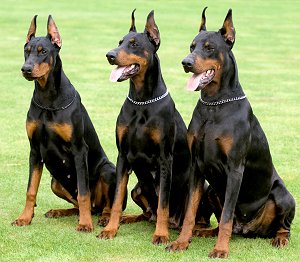Some pros of neutering a Doberman include: reducing the risk of certain cancers, decreasing aggression and roaming behaviors, and making them less likely to mark their territory. Some cons of neutering a Doberman include: increasing the risk of other cancers, potentially causing weight gain, and requiring more frequent vet visits for health checks. Ultimately, the decision to neuter or not neuter your Doberman should be based on your individual dog’s needs and what you feel is best for them.
There are many things to consider when making the decision to neuter your Doberman. On one hand, there are many health benefits that come with neutering, including a decreased risk of certain cancers and behavioral problems. On the other hand, neutering can also lead to weight gain and other issues.
Ultimately, the decision whether or not to neuter your Doberman is a personal one that should be made after careful consideration of all the pros and cons. If you went to know more about the pros and cons of neutering a doberman, keep reading!
When Should You Neuter a Doberman Pinscher?
Should Dobermans Be Neutered?
Dobermans are a popular breed of dog known for their loyalty, intelligence and courage. They are also one of the most common breeds to be used as working dogs in law enforcement and military settings. Due to their high level of energy and athleticism, Dobermans require a great deal of exercise and mental stimulation.
For these reasons, many people choose to neuter their Dobermans in order to help manage these behaviors.
What is the Best Age to Neuter a Doberman?
Most experts agree that the best age to neuter a Doberman is between 6 and 9 months old. This is because at this age, they have reached sexual maturity but are still young enough that the surgery won’t have as much of an impact on their overall health. There are some exceptions to this rule though, so it’s always best to consult with your veterinarian before making a final decision.
Will Neuter a Doberman Calm Him Down?
It is a common misconception that neutering a Doberman will calm him down. The truth is, there is no guarantee that neutering will have any effect on your dog’s personality or energy level. While it is true that some dogs do become more relaxed after being neutered, this is not always the case.
Each dog is an individual and will respond to neutering in his own way. If you are considering having your Doberman neutered, talk to your veterinarian about what you can realistically expect in terms of behavior changes.
What are the Negative Side Effects of Neutering a Dog?
There are a number of potential negative side effects of neutering dogs, which include:
1. Increased risk of obesity: Neutered dogs are more prone to weight gain and obesity than intact dogs, due to a combination of factors including reduced metabolism and decreased activity levels.
2. Increased risk of joint problems: Because neutering removes the hormones that help to maintain joint health, neutered dogs are at an increased risk for developing joint problems such as osteoarthritis later in life.
3. Increased risk of certain cancers: Neutering has been linked with an increased incidence of some types of cancer, including testicular cancer and hemangiosarcoma (a type of cancer that affects the blood vessels). However, it should be noted that the overall risks of these cancers is still relatively low. 4. Behavioral changes: Neutering can sometimes cause behavioral changes in dogs, such as aggression or hyperactivity.
These changes are usually not permanent and can be managed with training and behavior modification techniques.

Credit: www.yourpurebredpuppy.com
Unneutered Doberman
If you have an unneutered male Doberman, you may wonder what the pros and cons are of keeping him intact. On the one hand, your dog will likely be more protective and territorial if he is not neutered. On the other hand, an unneutered dog is at a higher risk for testicular cancer and can also be more aggressive.
Some people neutered their Dobermans to help with behavioral issues such as aggression or dominance. However, it’s important to remember that neutering will not automatically fix all behavior problems. If your dog is exhibiting aggressive or dominant behavior, it’s best to consult with a professional trainer or behaviorist to figure out the best way to address those issues.
So, what’s the bottom line? Whether or not to neuter your Doberman is ultimately up to you as the owner. Consider all of the factors involved before making a decision either way.
Can Dobermans Eat Grapes
Many people are curious about whether or not Dobermans can eat grapes. The answer is yes, Dobermans can eat grapes. However, it is important to note that grapes are considered to be a poisonous food for dogs and should therefore be given in moderation.
Doberman Puppy Not Eating
If your Doberman puppy isn’t eating, it could signify something serious. Here are some possible reasons why your pup might not be interested in food:
1. Your puppy may be sick. If your puppy is vomiting or has diarrhea, he may not feel like eating. Contact your veterinarian immediately if you notice other signs of illness, such as lethargy or fever.
2. Your puppy may be teething. Puppies start to teeth at around 3-4 months old, sometimes making them lose their appetite. If you notice your pup chewing on toys more than usual or drooling excessively, he may be going through this phase.
3. Your puppy’s food may not agree with him. Some puppies have sensitive stomachs and can’t tolerate certain food well. If you’ve recently changed his diet and he’s started refusing to eat, try switching back to the old food to see if that makes a difference..
Whatever the reason for your Doberman puppy not eating, it’s important to consult with your vet to rule out any underlying health problems..
Benefits of Neutering Dog
There are many benefits to neutering your dog, including reducing its risk of certain cancers and other health problems. Neutering can also help reduce problem behaviors, such as roaming, fighting, and marking territory. Overall, neutering provides numerous health benefits for your dog and can make them a happier, more well-behaved pet.
Cost of Spaying a Dog
The cost of spaying a dog can vary depending on the veterinarian, the dog’s age and weight, and where you live. In general, the average cost of spaying a dog is between $200 and $300. There are many factors that contribute to the cost of spaying a dog.
The most important factor is the size of the dog. Smaller dogs generally have lower surgical costs than larger dogs. The age of the dog also plays a role in determining the cost of surgery.
Puppies and young dogs usually have lower surgical costs than older dogs. Finally, where you live can also impact your surgery price. Veterinary prices can vary significantly from region to region.
If you are considering having your dog spayed, it is important to talk to your veterinarian about all associated costs. This way, you can make an informed decision about what is best for your pet and your budget.
Will Spaying Calm a Female Dog
The simple answer to this question is “yes.” Spaying a female dog will help to calm her overall demeanor. This is because spaying eliminates the heat cycle, which can cause a great deal of stress for both the dog and her owner.
In addition, spaying helps to reduce the risk of certain types of cancers and other health problems.
Female Doberman
Assuming you would like a blog post discussing the Doberman Pinscher: The Doberman Pinscher is a medium-large breed of domestic dog originally developed around 1890 by Karl Friedrich Louis Dobermann, a tax collector from Germany. The name “Doberman” comes from the fact that the original breeder was named Dobermann.
The word “pinscher” means “terrier” in German but was used to describe dogs without terrier ancestry; however, the term has become synonymous with the breed. In terms of appearance, male and female Dobermans are very similar. They both have sleek, muscular bodies with long legs and large ears that point straight up.
The most notable difference between male and female Dobermans is size. Male Dobermans are usually about 26 inches tall at the shoulder and weigh around 95 pounds. Females are typically 24 inches tall and weigh about 85 pounds.
Both sexes have short, smooth coats that come in black, red, fawn, or blue (grayish-black). All colors except for blue have rust-colored markings on the eyebrows, cheeks, chest, legs, and under the tail.
Conclusion
There are many factors to consider when deciding whether or not to neuter your Doberman. The pros of neutering include: reducing the risk of certain cancers, eliminating unwanted hormones that can lead to aggression and other behavioral problems, and making your dog more likely to be welcomed in public places. The cons of neutering include a small risk of complications from surgery, a potential for weight gain due to reduced activity levels, and a possible increase in joint problems later in life.
Ultimately, the decision of whether or not to neuter should be made individually after weighing all the pros and cons. Thanks for reading our blog post about the pros and cons of neutering a doberman.


